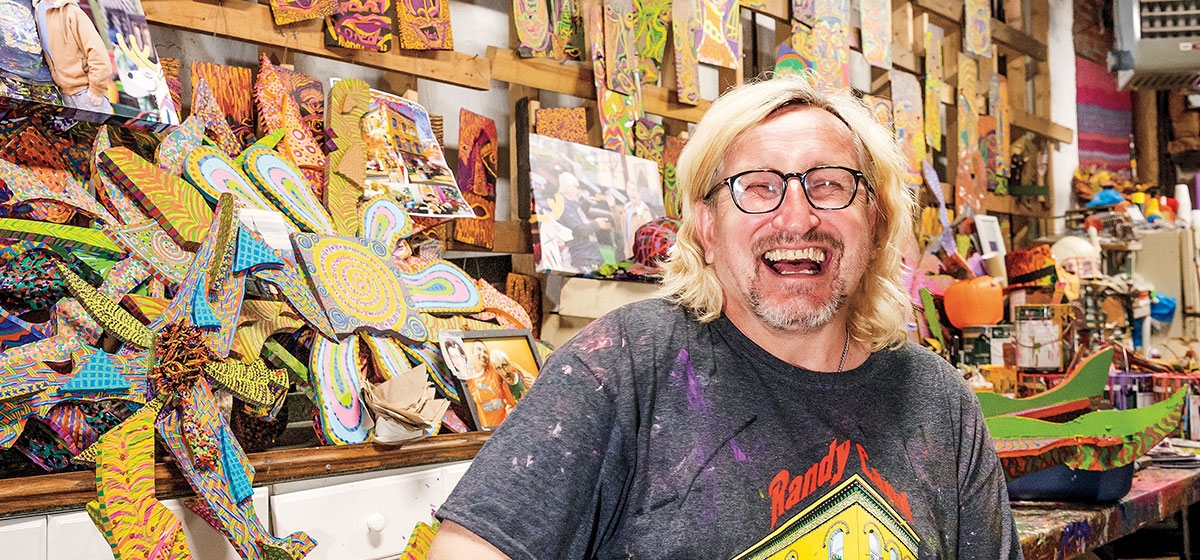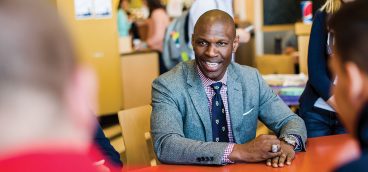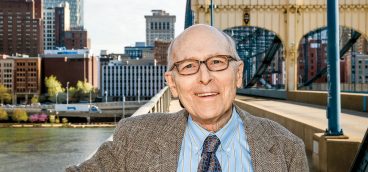Randy Gilson, Genius of the Human Spirit

Life began for me on January 27, 1957, in Titusville, Pennsylvania. My dad was from there and my mom came from a dairy farm in Mercer. She was a little country girl who loved to play the accordion, and she’d always go down to the tent revival meetings because she also loved Jesus. That’s where she met my dad.
[ngg src=”galleries” ids=”152″ display=”basic_thumbnail” thumbnail_crop=”0″]
Not long thereafter, those two simple folks fell in love, got married and had three boys and three girls. We lived in Meadville, near Allegheny College, and mom and dad became ministers and officers in the Salvation Army. But over time, dad learned that there were other ways of living. So, one day, he took off with a lady friend and threw himself into a life of liquor and other things, and he never came back.
After mom had the last of us children, she knew that she had to skedaddle, for our sake. So, when I was about nine years old, she loaded us all into a U-Haul truck, filled it up as much as she could with our belongings, and moved to Homestead, Pennsylvania, because it was the only place we could afford to live.
When I first heard about Homestead, I was tickled pink because I thought we’d have a barn, a corral, a lake, fishing and animals. But just before we arrived there, we reached the top of a hill, and mom said, pointing out, “That’s Homestead.” I looked and said, “But mom, that’s not the country.” “Well, that’s Homestead,” she said. “But it’s not the Daniel Boone Homestead,” I replied, and I was heartbroken. I was just a little guy suffering from ADHD, OCD, and some degree of autism. I was slow and set in my ways. I got excited about whatever I was thinking, and then, if things didn’t come true, I’d freak out—and I did.
In Homestead, mom registered us at Barrett Elementary School, which was just around the corner from where we ended up living. She wanted us to look nice for school, so she dressed us in nice clothes; little suits and stuff. But the school’s principal, a big Irish woman, said to my mom, “You can’t put your kids in this school.” Mom said, “We have to. We just got an apartment nearby.” Then the principal said, “This is a tough school. We don’t have a lot of white kids here. Your children are too soft. They won’t survive.” Hearing this, mom started to cry. She had run away from a bad situation, and she was tired and scared. So, what did she do? She put herself in God’s hands. “As long as I’m in God’s hands,” she thought, “I know that I will find the strength and the answers to get everything our family needs. The road may be rough, and we’re not going to have everything that everyone else has, but we’re going to be just fine here.”
Mom worked as an accountant for the Salvation Army, but she couldn’t work a lot because she had to take care of us kids. We lived mostly on welfare, with no help from dad. We had nowhere else to go, so mom fought with the principal at Barrett Elementary. Long story short, we ended up going to Barret after all. It was strange because I wasn’t used to seeing my mom fight like that, but I’m glad that she did. Mom always stood up to all the obstacles we faced. From this, I learned that, just because somebody says “no,” it doesn’t mean that life is over.
At the beginning, school was hard. My teachers said that I was too slow to go on to fourth grade, so they kept me back in third. I couldn’t read well, and couldn’t learn because I didn’t understand. I couldn’t take tests. I’d just blank out. So, there I was, this big white kid, in a class with a lot of younger African-American and Hispanic kids. And it really was a tough school in a minority community, with lots of poverty. But it was also awesome. I never made friends where I lived before. As ministers in the church, it seemed like every year or so, mom and dad would move us to another place. And because we were moving so much, I never got to know anyone. But in Homestead, we were around long enough for us to make friends.
We were poor and some kids pushed us around and called us “white trash,” which made us feel bad. To make matters worse, I flunked everything in school and started thinking that I was stupid, which made me angry. “Why did God make me like this? Other kids can read and pass tests. Why can’t I do that?” Well, I truly am a scatterbrain. My thoughts overlap a lot. I can think of, sometimes, 10 or 15 things, all at once, and I can “braid” my thoughts. That’s why I’m creative. But in school, I got nervous, so much so that our preacher told my mom, “You better put Randy on medication. He’s not normal.” Mom asked, “So, what’s wrong with him?” The preacher said, “He’s hyperactive. He can’t listen and, therefore, he can’t learn. He’s out of control and just needs to calm down. But,” he added, “at least he’s happy.” Then mom said, “That’s because Jesus wanted him to be happy. We’re not going to give Randy pills to calm him down. But if he ever becomes unhappy, we’ll get him fixed.” She truly believed that Jesus would teach me what to do.
While we lived in Homestead, we had just enough food, and few clothes. As I got older, I started realizing this, and hated it. “Why didn’t mom get a better father for us?” “That’s a good question,” mom said. “You see, Randy, you’re looking at life through the eyes in the front of your head. You’re seeing all the people who are ahead of you. Some of them have things that you would like to have, and it hurts sometimes.” I said, “But everybody else has a mom and a dad. Their lives are normal. Everything’s wrong with us.” Then mom said, “You’re too young to realize that the things you see in front of you are just part of your education. If you want something, you must work hard and figure out how to get it.” And mom wasn’t finished. “If you had eyes in the back of your head, you’d realize that there are as many people behind you as there are in front. There are people behind you who really don’t have anything. You have a mom, right? Well, many kids don’t have a mom. You have a roof over your head, right? Many people don’t have a roof. So, you see, Randy, you were actually born in the middle.” That’s when I learned to see life with a different set of eyes, and that’s what I do now. I teach people to look at their lives through different eyes.
All the while we were growing up, my siblings and I had been sent in the summer to farms owned and run by family members and friends. I remember the farmers tilling the soil, cultivating it, and then planting and watering seeds. They then took care of their fields and reaped the crops at the end of the season. I thought, “Maybe that’s what every person is: a seed! What we absorb is what we become.” Right then, I knew that I had to be very careful about what I absorbed if I wanted to grow and be healthy. And if there were any “weeds” in my life, I had to pull them out. I got rid of anybody who was going to pull me down.
“ ‘Maybe that’s what every person is: a seed! What we absorb is what we become.’ Right then, I knew that I had to be very careful about what I absorbed if I wanted to grow and be healthy.”
—Randy Gilson
When I look at my life, I think that my real problems started when I was just a little kid, at Christmas. Before we finally ran away to Homestead, I got a Christmas present from dad—an electric football game, the kind that you turn on and the players move from the vibration. I was so happy and, I think, for some reason, that made dad angry. Maybe he was so unhappy with his situation by that point that he wanted everyone else to be unhappy, too. As I played joyfully with my present, dad said, “Randy, put that game away.” And I said, “But dad, this is the best present ever. I want to play with it. It’s Christmas.” Then he said, “Put it away or I’ll take it from you.” Well, he took it away all right and, for years afterward, at Christmastime, I would ask him, “Where is my present, dad?” He’d say, “Why are you still dwelling on that?” I said, “Because it belonged to me, and I want it back.” I don’t know why he held onto it, but he did. It wasn’t until about 35 years later that I finally got it back, after my dad’s kids from his second marriage played it to death. It was a busted game in a busted box by then, but it was mine. To this day, I don’t like to get presents. I prefer to give them instead.
Mom was married to her beliefs, to Jesus, and she was a wise woman. When I was 17, she told me, “Randy, there are all kinds of costumes out there: nationality costumes, Halloween costumes, ethnic costumes, and so on. The costume I’m wearing now will disappear one day.” I said, “Are you trying to talk to me about death?” She said, “Yes. You know me as ‘Mom.’ I’m in that costume, in one place, and you can find me in that place. But, when I go to Heaven, I won’t be in that costume anymore. I’ll be everywhere. I’ll be in the wind that blows through your hair, and in the birds that sing in the trees. You will see many symbols of what I taught you, and you’ll find me everywhere.” I know that my mom is watching me now. I can tell.
In 1978, I moved to the North Side of Pittsburgh. At that time, the whole area had been pretty much filled with drugs. When Pittsburgh’s bridges were built, many people decided that they wanted to move out to bigger schools and on to bigger dreams, and this little neighborhood collapsed. Sure, many of the old folks stayed, but many houses were also left empty. So, people who didn’t have decent homes came over where they could “squat,” and pretty much live for free. The neighborhood had good elements; bad elements; old elements; and new elements. But it was a bit scary. People told me, “Don’t go there. You’ll get killed.”
When I first came here, I moved to the hill. Then four years later, I moved down to Taylor Avenue, having talked a friend of mine into buying a house there. Soon, I started doing art on the street and, at first, people laughed at me. They thought I was weird because I’m such a ball of nervous energy. But kids from across the street came over and asked if I worked for the city. I said, “No. I work for you. You’re the future. When I go to Heaven, I want the world to be better for you.” I love kids because I’ve been one all my life.
Soon, the neighborhood kids started coming around all the time. In a week, my “class” went from about three to maybe 15 or 20 kids, and I was thinking, “This is crazy.” All these kids were excited about what I was doing. But the gangs were still out there, doing their thing, and none of my adult neighbors would talk to me. I was the new kid on the block, and I’m sure that they were thinking, “Who is this guy? Is he a bum? What is he doing with our kids?” They probably thought I was a nut, so they started to ask their sons and daughters, “What are you doing with that man?” And the kids would say, “He teaches us about taking care of the earth and about Jesus. And he teaches us about being a village, and a family.”
Many people found out about me when WQED-TV produced a program called “The Spirit of Pittsburgh,” where I shared my “guerilla gardening” tips with Mr. Rogers. When that documentary came out, everybody heard my story, about how I worked with the North Side kids, built urban gardens and cleaned up local parks. Soon, moms and dads on my street began opening their windows and saying, “Hey Randy. We’re having a cookout. Do you want a hot dog? A hamburger?” Before I knew it, windows started popping open on every block. And then the grandparents started adopting me. Isn’t that crazy? As grown-ups, we put up walls because of our fears. It can be a scary world out there, for sure. But it takes the children, the “seeds,” to connect us all. The innocence of a child asking me and me explaining that all I wanted was to try to make the world a better place for them, turned my street work into a magical thing.
Since I was a little guy, I’ve always been a loner. I got to know a lot of people, but I didn’t know how to connect with them. I met my partner, David Paul Francis McDermott—“Mac”—25 years ago, who was a loner, too. But he found me funny, and we became good friends. That same year, in 1994, I was in the neighborhood doing all this cool stuff when I learned that a particular building, which I had my eye on, was up for sale. So, I went to the bank and the lady there didn’t want to give me the money to buy the building. “How much do you have in your savings and your checking accounts?” she asked. “Do you have any stock?” I shook my head and said, “I don’t have any of that.” Several weeks later, I returned to the bank, and that same lady was a little annoyed. She looked at me and asked, “What are you doing here?” I said, “I feel that today is my lucky day. Look at that desk of yours. Many people have sat in front of that desk and have found their tomorrows. I believe that today is my day and I also believe that you’ll meet me halfway.” When I said that, she laughed and said, “Look, I know who you are, Randy,” because I was in all the newspapers and in “The Spirit of Pittsburgh” TV program. The next day, the bank gave me a $10,000 credit card. A couple of weeks after that, I bought the building. And Mac, my new friend, looked at me, astonished and said, “How is this happening, Randy? We’re both broke and we just bought a building!” Mac and I were just two odd gentlemen who became best friends and then, ultimately, lovers and partners for life. We worked on that building together, and that building became “Randyland.”
First, we painted the building bright yellow, so it could be seen from Mount Washington. And as other buildings were being torn down, trucks came by to collect scrap metal and other stuff. I started stopping them and asking, “Can I look in your truck to see if you’re hauling away anything that I could use?” Then I went up and down the alleyways and dived into the dumpsters, collecting different and colorful oddities like pink flamingos, mannequins and plastic dinosaurs. These expeditions and discoveries got me excited.
Many people know “Randyland” and some call me an artist, but I don’t believe that. I’m an oddball. I don’t sell my “art.” I don’t put my stuff in galleries. I don’t look for funding. I do what I do because of love. But even though I’m not an artist, I started teaching myself to paint. Some people have ideas, blueprints, stencils, and so on. I just pick up my paint brush and do it. I don’t follow any “rules,” because I never knew there were any rules to follow. I began by making totem poles, and the energy started flowing. In a burst of creativity, I decided to paint everything, inside and outside our building, all the way around, and people began to stop by and look on their way to the Mattress Factory, a museum located just down the street. Another one of our neighbors, City of Asylum, hosts dissident writers and poets from around the world, and they also started to stop by. One day, I saw a group of them outside my gate, but nobody dared to come in. So, I asked one for a favor. “Would you write ‘Welcome’ on our wall in your own language?” He did. Over time, other people from other countries did the same. On another day, I found a fence in the garbage and cut out a bunch of pieces shaped like arrows. Now, if a person comes from a place and they don’t find “Welcome” written on our wall in their language, I’ll have them make an arrow pointing to their homeland.
I believe that I’m a messenger. I want to teach people that happiness cannot be achieved through materialism. That’s what I think my purpose is in the world. Mac, my husband, was my backbone. He gave me the mental and financial support to keep going. But Mac had to go to Heaven last January, because it was his time. All in all, were just two guys who were kicked to the curb; two flunkies; two losers; two nobodies. But something happened. We met each other, it was meant to be, and we started to find that we could make happiness and do things to help ourselves and, at the same time, help others. So, look in the mirror and love yourself, baby. You are uniquely, perfectly, individually, one of a kind; uniquely, perfectly, individually you. You don’t have to be like anybody else. You are beautiful just the way you are.






